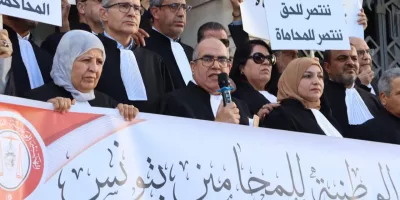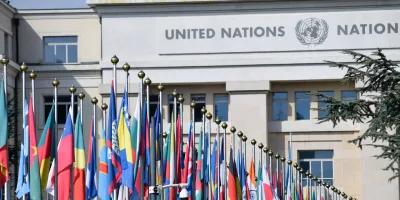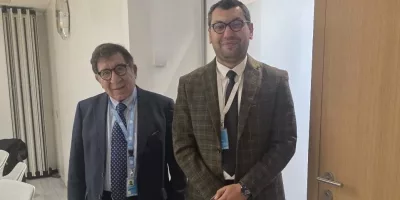Press release
By: Committee for Justice
Geneva: October 27, 2021
The Executive Director of the Committee for Justice, Ahmed Mefreh, delivered a speech on Wednesday during a meeting on Egypt at the European Parliament’s Human Rights Committee. Other attendants in the meeting included the family of the detained Egyptian activist Alaa Abdel-Fattah, and the family of the Italian student Giulio Regeni, who was tortured to death in Egypt in 2016.
During his speech, Mefreh said that Egyptian authorities have not met their minimum international commitments regarding the protection of human rights within their territories, especially in prisons and detention centers.
Renewed arrest and enforced disappearance:
Mefreh said that since the European Parliament resolution of 18 December 2020 on the deteriorating situation of human rights in Egypt, in particular the case of the activists of the Egyptian Initiative for Personal Rights, CFJ has continued to face challenges during its work in documenting and verifying human rights violations. Authorities have continued to impose a tight security grip and complete blackout on information, while denying that violations took place, and covering up data through intimidation, threats and abuse of victims and their families if they complained or sought help. Nevertheless, Mefreh said, CFJ has been able to document 5,814 violations inside prisons and detention centers from January to September. The most prominent of such violations was the detention of more than 3,600 political opponents of the government, whether for the first time or a renewed arrest, and the involvement of security services in more than 1,570 cases of enforced disappearance of opponents, activists, politicians and ordinary citizens from within and outside detention centers. The most recent example was the ludicrous arrest of the robot Ai-Da ahead of a contemporary art exhibition at the pyramids under the pretext of “security”.
Meanwhile, Mefreh added that CFJ has documented 42 deaths in custody, most of them attributed to the denial of health care. The organisation has also documented a rise in hunger strike and suicide attempts, including by self-immolation, among a number of political prisoners in the notorious Scorpion Prison due to ill-treatment and denial of visits for many years.
“Egyptian authorities responded to that with more abuse, humiliation, beatings, isolation, and threats to ‘use everything’ against victims,” he said.
Human rights under the pandemic:
Regarding the situation in light of the Covid-19 pandemic, Mefreh said that while the authorities insisted on violating international recommendations regarding health measures related to preventing the spread of the Covid-19 pandemic inside detention centers, the organisation has documented the arrest and pretrial detention of hundreds of thousands on the pretext of their violation of curfew during the past year. This has led to an increase in Covid-19 cases that CFJ has documented and verified until today.
“While the Ministry of Interior claims to have vaccinated the majority of inmates in Egyptian prisons and detention centers, pointing to the vaccination of about 5,000 inmates with chronic diseases, this number – if true – is negligible compared to the 114,000 prisoners languishing in Egyptian prisons, according to estimates by the United Nations High Commissioner for Human Rights,” Mefreh said.
Death sentences and terrorism lists:
Concerning death sentences, Mefreh pointed out that CFJ monitored the issuance of death sentences against 116 defendants, and the execution of dozens of others between January and September 2021. Meanwhile, over the past three months, CFJ has documented 500 cases, involving 2,299 defendants, heard by courts in accordance with the Terrorism and Emergency Law, which is still in force and is constantly being extended. Additionally, the organisation documented the cases of 3,436 defendants prosecuted on charges of broadcasting false news, the same charges brought repeatedly against innocent citizens. Likewise, authorities have attributed deadly railway accidents to “extremist elements” rather than the deterioration of the public transport system.
Mefreh added that the arbitrary decisions to add individuals to the so-called “terrorism lists” still affect hundreds of citizens who “have nothing to do with the opposition or terrorism.” The number of those added to the lists so far, according to CFJ’s documented data, has reached 2775 people. Such decisions have subjected the listed individuals to further violations of their human rights, including the right to private property, housing, work, demonstration and freedom of expression, Mefreh said.
Systematic torture in Egypt:
Furthermore, Mefreh pointed out that torture in Egypt has become an “institutional and purposeful practice.”
“Torture begins at the time of arrest, continues during interrogation and detention by police and security officials, and is then covered up by prosecutors and judges who are legally supposed to investigate it,” he said, adding that torture is practised by prison staff and police officers, which means that if citizens are victims of arbitrary arrest and/or enforced disappearances, “they are not only subjected to punishment established by law, and are not only deprived of the minimum rights of a fair trial, but each of the authorities, including prosecutors, judges, prison staff and directors, enacts its own penalties for them, either by recycling their cases or by depriving them of healthcare or sometimes ill-treatment leading to death.”
Based on the above, Mefreh said that it is “not surprising that all legal avenues of mediation between the authority and citizens through complaints mechanisms and local communications are closed.” The Public Prosecution and the Public Prosecutor have ignored tens of thousands of complaints submitted to them on behalf of victims of arbitrary detention, enforced disappearance and deliberate denial of health care. “The complicity of the National Council for Human Rights in such violations by remaining silent about them, and the restriction of the role of the State Council’s courts in handling these complaints after amending the laws of the judiciary since 2019, have led to the blockage of all communication links between the authorities and citizens,” Mefreh stated.
“Amid the closure of intermediary spaces and the suspension of judicial oversight as well as all avenues of complaints, it is no wonder that conditions in detention centers have contributed to suicide attempts, including by self-immolation, as witnessed in Scorpion Prison in the past few months,” he added.
EU’s moral obligation:
He pointed out that the continuation of violations at the pace and manner explained in the speech does not contribute to the sustainability of the regime, threatens the foundations of peace and societal security, and causes the victims to lose hope for survival, justice and a decent life. This in turn threatens the spread of violent extremist ideas in places of detention if the authorities do not address the situation. It also provides a fertile environment for increasing migration by Egyptian youth who make up the majority of detainees and prisoners in the country and who are the main targets outside prisons.
Mefreh concluded his speech by highlighting that the European Union “has a moral obligation to place human rights among its priorities in its partnership and cooperation with Egypt.” He added, however, that if the EU is concerned about preserving its mutual interests with its regional partner Egypt, it should also be aware that its other priorities of combating migration and extremism require addressing the factors that threaten security and societal stability in the country.






